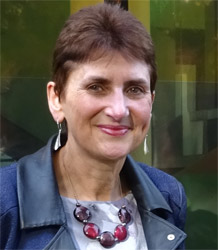Anne Barlow
Anne’s latest project is the Wellcome Centre funded ‘HeaRT Project’ which considers the role of child inclusive mediation in promoting mental health and wellbeing outcomes in young people following parental separation. Her research themes within the network mainly focus on children’s voices, family justice, family law and technology and relationships.
Email: A.E.Barlow@Exeter.ac.uk
2021
Barlow A and Lowe N (2021). The Effects of EU Law on Family Law in England and Wales - Children First?. In Scherpe J, Bargelli E (Eds.) The Interaction Between Family Law, Succession Law And Private International Law, Adapting to Change. Cambridge: Intersentia, 101-119.
2020
Barlow A (2020). Modern Marriage Myths- the dichotomy between expectations of legal rationality and lived law. In Akhtar R, Nash P, Probert R (Eds.) Cohabitation and Religious Marriage Status, Similarities and Solutions. Bristol University Press.
Barlow A and Ewing J (2020). An Evaluation of 'Mediation in Mind' - Final Report. Department of Work and Pensions, Exeter, University of Exeter.
Ewing J, Barlow A, Janssens A and Blake S (2020). Working out relationships: research, education and the quest for lasting love. Child and Family Law Quarterly, 32(4): 331-354.
Hunter R and Barlow A (2020). Reconstruction of family mediation in a post-justice world. In Roberts M, Moscati M (Eds.) Family Mediation: Contemporary Issues. London: Bloomsbury, 11-32.
2019
Janssens A, Blake S, Allwood M, Ewing J, Barlow A (2019). Identifying Education Programmes for Relationship Skills among 11 to 18 year-olds: a Systematic Review. Journal of Sex Education, 20(5): 494-516.
2018
Barlow A (2018). Valorisation of household labour through relationship and property law: Challenging perspectives from England, Wales & Scotland. In Declerck C, Verstappen L (Eds.) Valorisation of Household Labour in Family Property Law a Comparative Perspective. The Hague, the Netherlands: Eleven International, 43-59.
2017
Barlow A, Ewing J, Hunter R and Smithson J (2017). Creating Paths to Family Justice: Briefing Paper and Report on Key findings. Exeter, University of Exeter.
Barlow A, Hunter R, Smithson J and Ewing J (2017). Access to What? LASPO and Mediation. In Flynn A and Hodgson J (Eds.) Access to Justice and Legal Aid Comparative Perspectives on Unmet Legal Need. Oxford: Hart Publishing Limited, 239-253.
Barlow A, Hunter R, Smithson J and Ewing J (2017). Mapping Paths to Family Justice: Resolving Family Disputes in Neoliberal Times. London, England, Palgrave Macmillan.
Barlow A (2017). Regulation of cohabitation, changing family policies and social attitudes: a discussion of Britain within Europe. In (Ed) Marriage and Cohabitation: Regulating Intimacy, Affection and Care. 485-487.
Barlow A (2017). Rising to the post-LASPO challenge: How should mediation respond?. Journal of Social Welfare and Family Law, 39(2): 203-222.
Smithson J, Barlow A, Hunter R and Ewing J (2017). The Moral Order in Family Mediation: Negotiating Competing Values. Conflict Resolution Quarterly, 35(2): 173-196.
2015
Ewing J, Hunter R, Barlow A, Smithson J (2015). Children's voices: Centre-stage or side-lined in out-of-court dispute resolution in England and Wales?. Child and Family Law Quarterly, 27(1): 43-61.
Barlow A and Lowe N (2015). European Family Law in Action: Informal Relationships in England and Wales. Commission on European Family Law, The Hague, Intersentia.
Hunter R, Barlow A, Smithson J and Ewing J (2015). Paths to Justice in Divorce Cases in England and Wales. In Maclean M, Eekelaar J, Bastard B (Eds.) Delivering Family Justice in the 21st Century. Oxford: Hart Publishing Ltd, 145-162.
Barlow A (2015). Solidarity, autonomy and equality:. mixed messages for the family?. Child and Family Law Quarterly, 27(3): 223-235.
Smithson J, Barlow A, Hunter R, Ewing J (2015). The “child’s best interests” as an argumentative resource in family mediation sessions. Discourse Studies: an interdisciplinary journal for the study of text and talk, 17(4): 1-15.
- Cohabitation, equal Civil Partnership and the common law marriage myth
- Creating Paths to Family Justice
- An Evaluation of ‘Mediation in Mind’
- The Healthy Relationships Knowledge Exchange Project
- The HeaRT Project
- Mapping Paths to Family Justice
- The Rights Idea?
- Rosie’s Story
- The Shackleton Relationships Project
- Working out Relationships?


